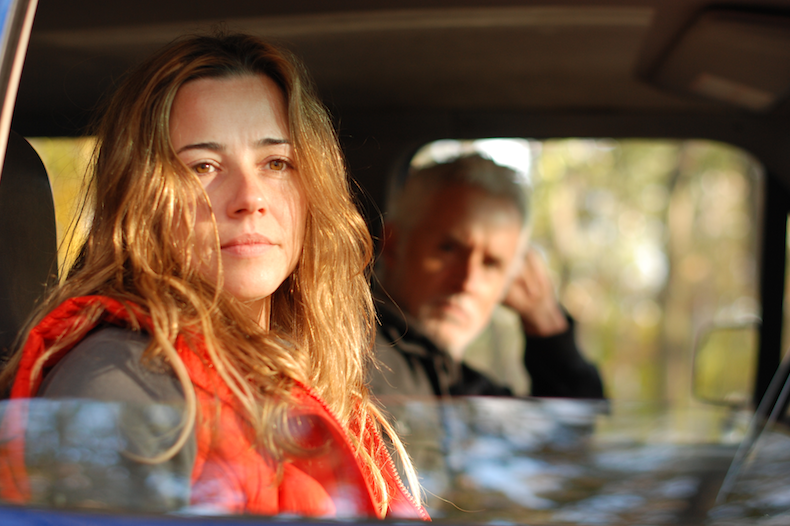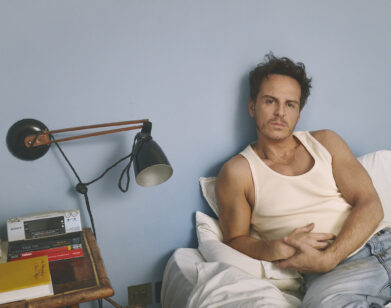Linda Cardellini’s Return

ABOVE: LINDA CARDELLINI AND JOHN SLATTERY IN RETURN
Fans of Linda Cardellini are a broad bunch; there are the 20 or so million people that tuned in E.R. every week when Cardellini played feisty nurse Sam Taggart, those of us who learned the rules of perm-care from Cardellini’s cameo in Legally Blonde, quite a few no-longer-so-little children (and some diehard Freddy Prinze, Jr. fans—it was the early 2000s, after all) who saw Cardellini take on Velma in those somewhat unfortunate Scooby Doo films. We, however, have been a Cardellini fan since 1999, when Linda donned that surprisingly chic green military jacket to play Lindsay Weir on the short-lived but frequently referenced Freaks and Geeks. The Freaks and Geeks crew, or the male faction of Freaks and Geeks, are getting quite a bit of attention these days—Seth Rogan, James Franco, Jason Segal, and Martin Starr all met on the set of Paul Feig and Judd Apatow’s cult show. While she’s quite happy to chat about the rest of the former Freaks, Cardellini is off doing her own thing. Her most recent project: starring as Kelli, a reserve soldier rehabituating to her life in Ohio after a being sent to Iraq in the film Return.
The theme of a soldier returning from war is hardly new, yet it is rarely approached from a woman soldier’s perspective, or treated with such subtlety. Whereas films such as Stop Loss rely on old-fashioned dramatic twists, what makes Return worth watching is that it manages to convey the immense tension of a “return” by recounting Kelli’s quotidian life. Everything has changed for Kelli, but in part because very little has changed about the home that Kelli left behind. That Kelli is expected to drift back into the same routine of dropping off children at school and having a few Friday night beers with the girls is ultimately what cements her disenfranchisement.
We spoke with Linda via phone about preparing for Return, her past roles and where she wants her career to go next.
EMMA BROWN: I just saw your movie Return; you’re in every scene! That must have been pretty exhausting.
LINDA CARDELLINI: It was the biggest role I’ve been able to play and just such a phenomenal character. I’m so excited about the movie.
BROWN: You don’t often hear about Iraq from the perspective of female soldiers.
CARDELLINI: I think it’s coming more and more into people’s consciousness as more and more women return. That’s one thing that I liked about the story—that [director] Liza [Johnson] told it in a way that I’d never really seen that story be told and, of course, it being from a woman’s perspective as well.
BROWN: How did you get involved in the film?
CARDELLINI: I was in New York and I had finished my run on E.R. and I really wanted to do something different, so I took a step back. I’d been working nonstop for a long time and I thought, “I’m going to wait until I really get a roll that I can sink my teeth into.” I was thinking about doing a play, or something else—then I got that script. The day before I left [New York] I met Liza and I just thought she was incredibly special, the way she came from a visual arts background, the way she spoke about the script and the way the script was written, it had so many small details that happen to this woman [and cause] her life to unravel. I thought it was really restrained way to tell such a tragic story of a woman soldier coming home from a war zone.
BROWN: How did you research the part?
CARDELLINI: The film is incredibly independent; it took a while to get the money together even after I was cast. What seemed frustrating at the time because we couldn’t make the movie right away actually turned out to be a luxury, we had time to research. I spent the year and a half that it took to get the film into production [preparing with Liza]: we went to meet soldiers together, we travelled to the town that the movie was set in together, we talked with women who had served, men who had served, we spent some time on a marine base, we spent some time learning the things that Kelli would have known from basic training. We just tried to use the time wisely while we were waiting for the film to be funded and made.
BROWN: Were soldiers that you talked to happy to share their stories with you?
CARDELLINI: Some people were more reticent than others; everybody was very kind about it and generous, I just think that some people have a harder time talking about things. Some people didn’t have a hard time at all and were being redeployed and weren’t dealing with things like PTSD, and some people were. One thing that I think the movie speaks to is that it’s hard for someone who hasn’t been over [to Iraq or Afghanistan] to understand what it is like to be over there and come home. It’s a hard divide in peoples’ lives; the people at home want to understand, and the people who come back want to be understood but there’s this gap.
BROWN: Yes, that disconnection definitely seems to be a problem your character Kelli is struggling with—I can’t imagine what would have happened if you’d tried to ask her for help researching your role. What was the most challenging aspect of portraying Kelli?
CARDELLINI: I think the hardest thing about the part is the responsibility that you feel playing something that is so real and resonant in our times. There are people coming home right now with those stories, and I’m just an actress pretending to be that person. You hope that you can shed some light on somebody’s predicament; I felt a responsibility to the women and the men that I spoke with, and the women and the men that are over there, to try and be as honest [as possible] about what [their predicament] could be like. I felt that responsibility heavily and hope that I am able to do right in somebody’s eyes.
BROWN: Have any of the soldiers that you talked to seen the film?
CARDELLINI: One person just saw it. She had an amazing response to it.
BROWN: Are you nervous about the reactions of other people?
CARDELLINI: I’m excited for the movie to get out there and for its voice to be heard. Everyone that worked on the film did a lot of work in very little time, with very little resources and we made something that we’re proud of. I’ve been a little bit of a shut-in [laughs] because I’m about to give birth, so I haven’t been able to go to all of the screenings and most of the screenings that I went to were in Europe, I haven’t really been to a screening with a bigger audience in America, so I don’t know how American audiences are reacting, I’m getting feedback from other people at screenings cause I have to stay close to home in case the baby comes. But I was nervous, I wanted to know what people thought, and I wanted to experience it if at all possible, and so far it’s been really positive.
BROWN: How did you first get into acting?
CARDELLINI: I always thought I was a little shy, especially compared to my brother and my sister, but I guess I was always the kid doing performances in the front room. I always say that I think you have to have a little bit of a screw loose to think that you can [become an actor] because the odds are so against you. I was just crazy enough to think I could do it.
BROWN: Your body of work is quite diverse.
CARDELLINI: Thank you.
BROWN: What would you like to do more or less of?
CARDELLINI: Playing a role like this was phenomenal, and I’ve been waiting for a really long time for someone to give me the opportunity; and I hope this gives me the chance to play a lot more substantial female roles in film.
BROWN: Do you prefer film to television?
CARDELLINI: I like both. They’re very different—one’s a marathon and one’s a sprint, and sometimes it’s nice to sprint. I think I’m going to spend some time learning how to be a first-time mom, and then I’ll go back to work. I don’t know what I’m going to do yet, but for the first time I’m trying not to put pressure on myself to decide what to do at this moment, and just sort of go with what’s happening. After I finished E.R., I wanted to concentrate on re-examining what kind of actress I am and taking time for real-life things.
BROWN: Were you sad when you left E.R.?
CARDELLINI: It was an amazing community of people; I miss that the most. I was there for six years, longer than high school, longer than college. It was the longest thing I’ve ever stuck with, and leaving those people was very, very hard.
BROWN: I can’t believe it finished! It was such a consistent show for so long, I never thought it would end. When people recognize you, is it mostly from E.R.?
CARDELLINI: It really runs the gamut. The fans from Freaks and Geeks are very different from the fans from Scooby Doo, and Scooby Doo [fans] are very different from the fans from E.R. I have sort of the career where, if you are a fan, you’ve been following me for a while, and you really like something that I’ve done, so meeting those people is always a really gracious experience.
BROWN: I’m surprised people recognize you from Scooby Doo, with your Velma glasses and your hair…
CARDELLINI: Thank you! I get recognized less from that. Usually it’s if somebody knows that it’s me and they tell their kid. When it first came out, I could stand next to the poster, and nobody would know that it was me in the poster, which I found entertaining.
BROWN: Do you keep up with your cast mates from Freaks and Geeks? It seems like they’re just exploding these days.
CARDELLINI: Yes, we’re always happy when we run into each other. I saw Judd last month and I see Busy [Philipps] quite a bit; Sarah Kagan and I were at a film festival together in Paris and we went to the Eiffel tower. I got a really nice phone call from Martin [Starr] about my impending motherhood. All of the younger cast members are grown-up men now! We just had a big reunion last year so we all saw each other, some of us for the first time in a long time, some see each other more often. I’m so excited for Paul [Feig] and all of the things that have happened to him and Bridesmaids.
RETURN IS CURRENTLY SHOWING IN SELECT THEATERS IN NEW YORK AND WILL BE RELEASED IN LA ON FEBRUARY 22 AND ON VIDEO ON DEMAND FEBRUARY 28.






